牛津译林版(2019)Unit 4 Exploring literature 情态动词的用法(共41张PPT)
文档属性
| 名称 | 牛津译林版(2019)Unit 4 Exploring literature 情态动词的用法(共41张PPT) |
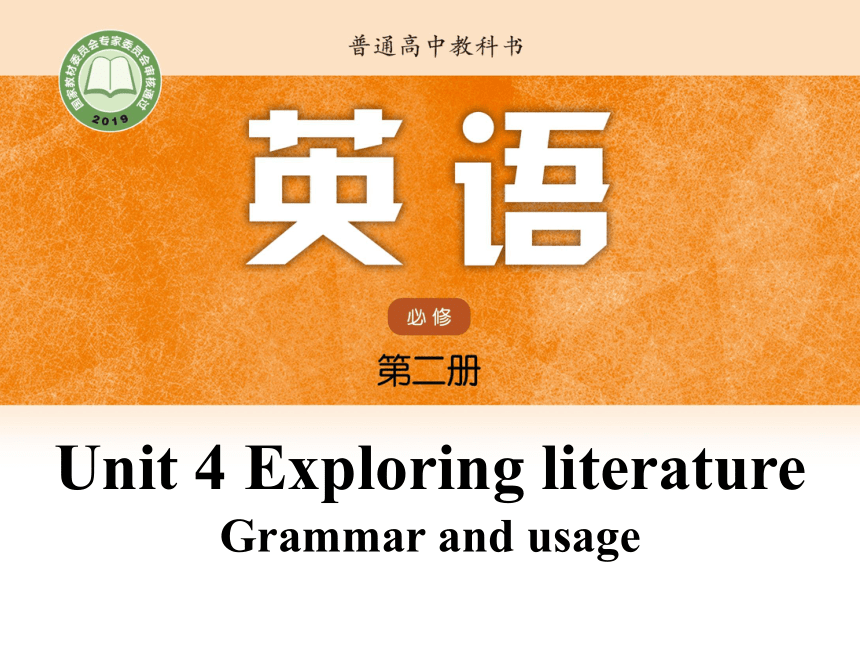
|
|
| 格式 | zip | ||
| 文件大小 | 2.6MB | ||
| 资源类型 | 试卷 | ||
| 版本资源 | 牛津译林版(2019) | ||
| 科目 | 英语 | ||
| 更新时间 | 2021-03-29 00:00:00 | ||
图片预览

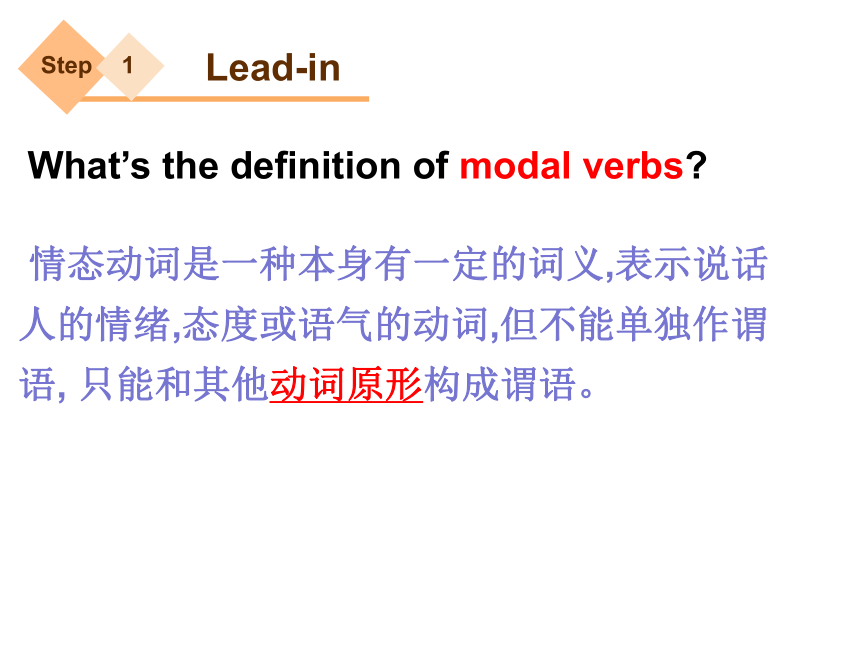
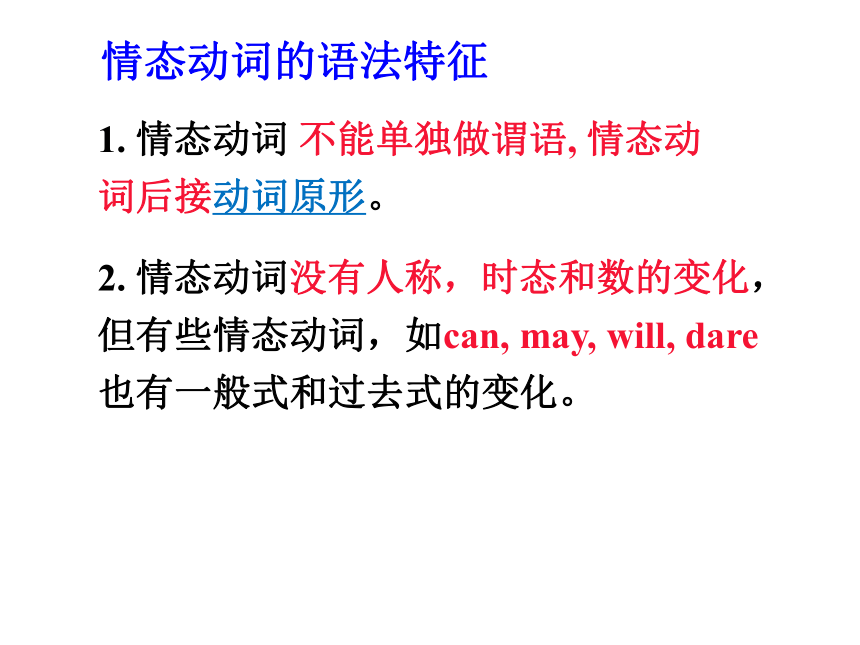
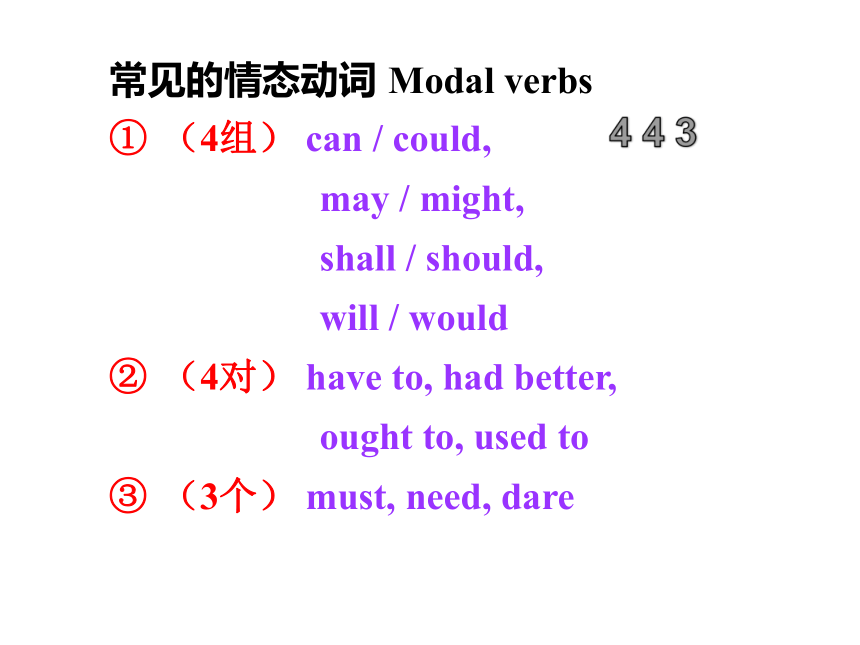
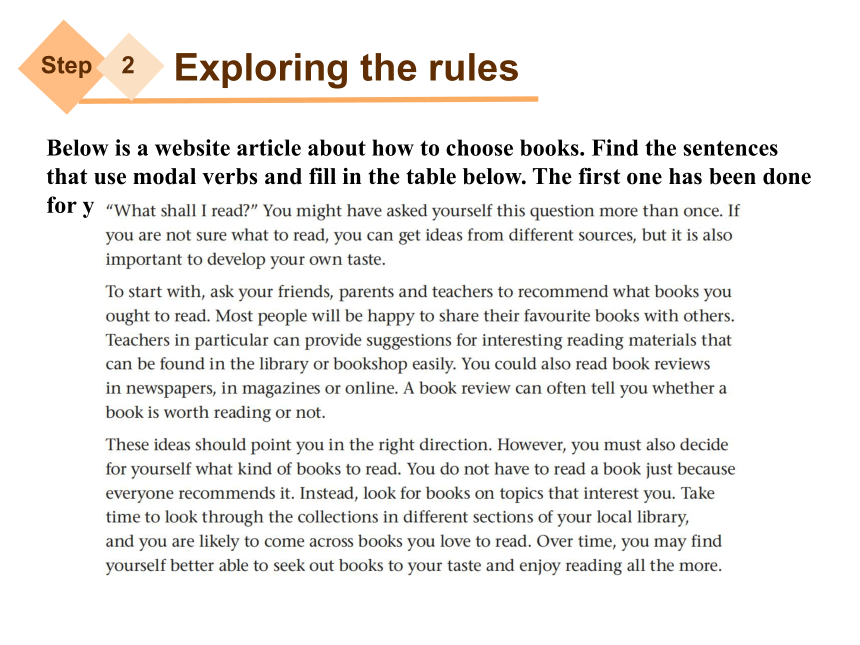
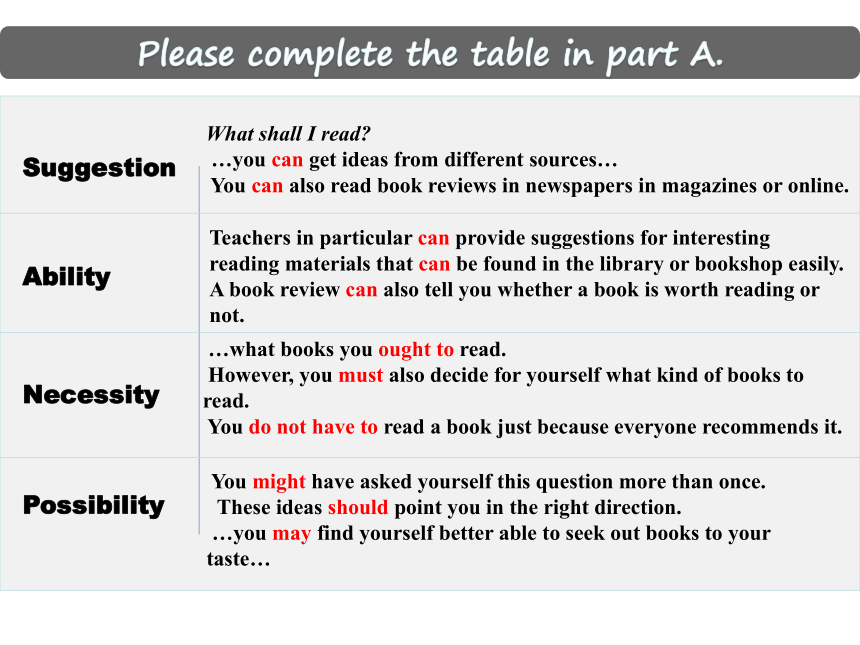
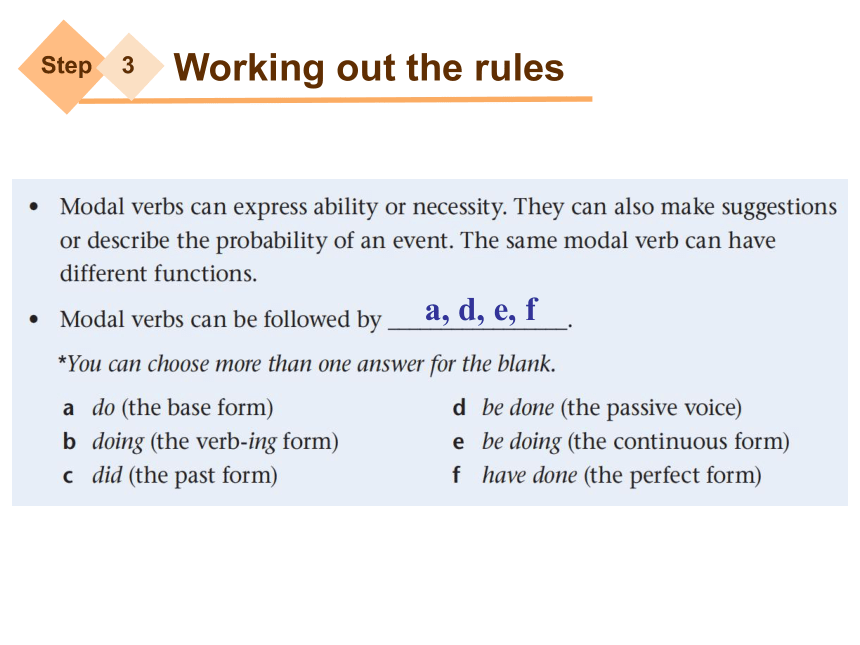
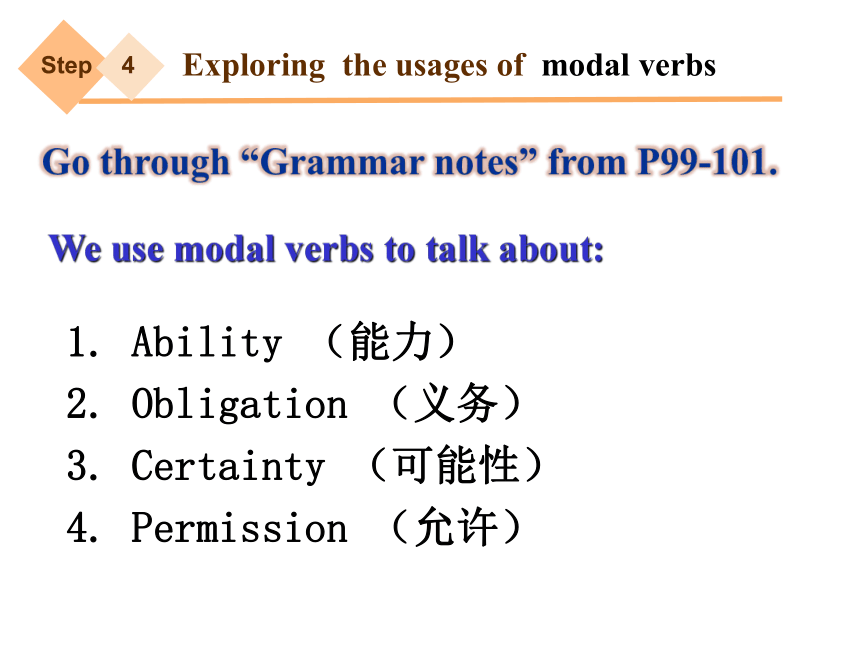
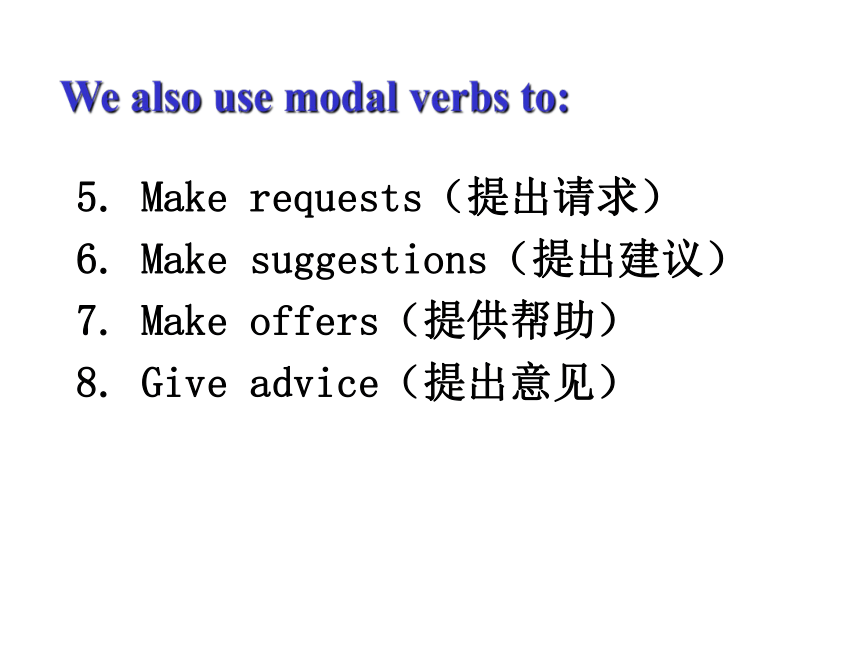
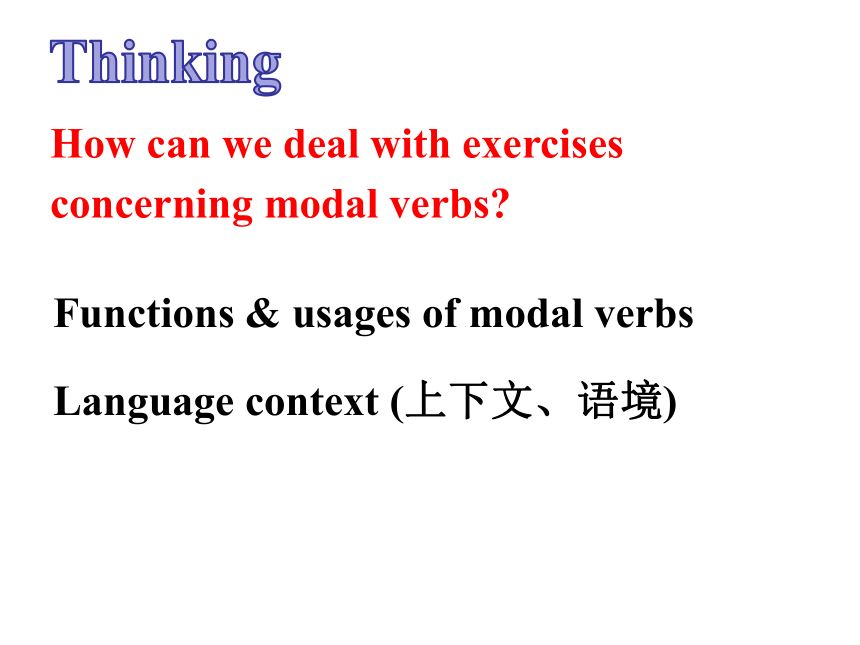
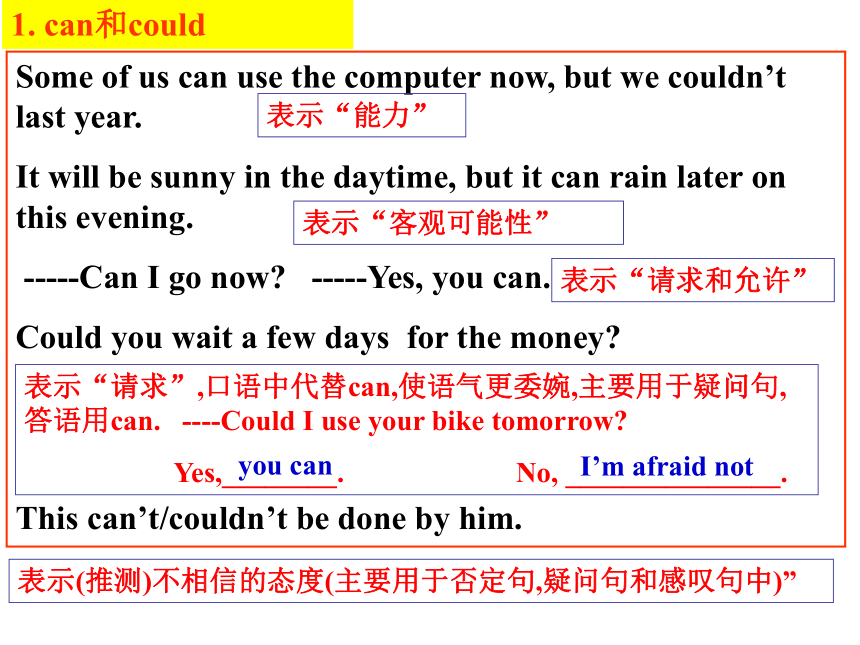
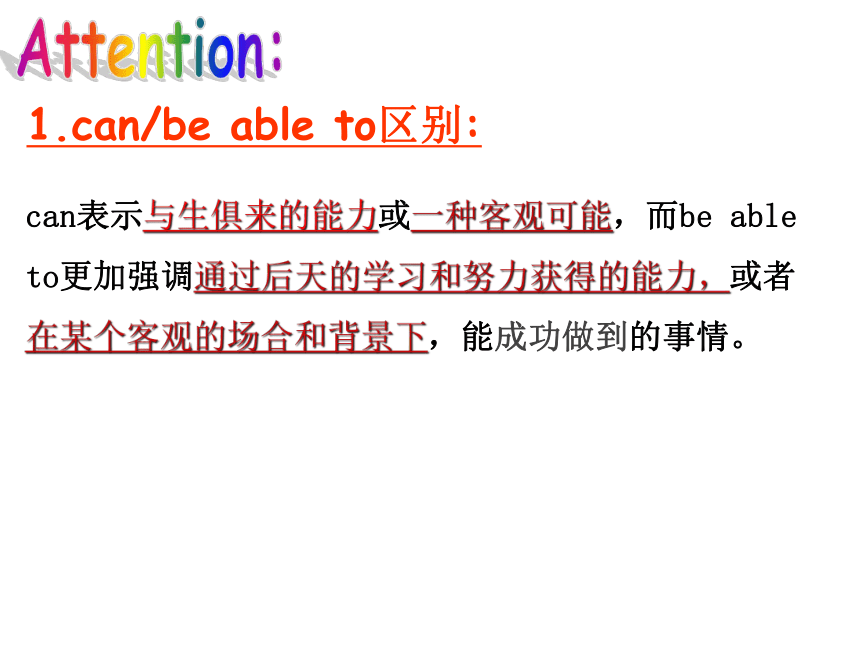
文档简介
(共41张PPT)
Unit
4
Exploring
literature
Grammar
and
usage
Lead-in
1
Step
What’s
the
definition
of
modal
verbs?
情态动词是一种本身有一定的词义,表示说话人的情绪,态度或语气的动词,但不能单独作谓语,
只能和其他动词原形构成谓语。
情态动词的语法特征
1.
情态动词?不能单独做谓语,
情态动词后接动词原形。
2.
情态动词没有人称,时态和数的变化,但有些情态动词,如can,
may,
will,
dare也有一般式和过去式的变化。
常见的情态动词
Modal
verbs
(4组)
can
/
could,
may
/
might,
shall
/
should,
will
/
would
(4对)
have
to,
had
better,
ought
to,
used
to
(3个)
must,
need,
dare
Exploring
the
rules
2
Step
Below
is
a
website
article
about
how
to
choose
books.
Find
the
sentences
that
use
modal
verbs
and
fill
in
the
table
below.
The
first
one
has
been
done
for
you.
Suggestion
Ability
Necessity
Possibility
What
shall
I
read?
…you
can
get
ideas
from
different
sources…
You
can
also
read
book
reviews
in
newspapers
in
magazines
or
online.
Teachers
in
particular
can
provide
suggestions
for
interesting
reading
materials
that
can
be
found
in
the
library
or
bookshop
easily.
A
book
review
can
also
tell
you
whether
a
book
is
worth
reading
or
not.
…what
books
you
ought
to
read.
However,
you
must
also
decide
for
yourself
what
kind
of
books
to
read.
You
do
not
have
to
read
a
book
just
because
everyone
recommends
it.
You
might
have
asked
yourself
this
question
more
than
once.
These
ideas
should
point
you
in
the
right
direction.
…you
may
find
yourself
better
able
to
seek
out
books
to
your
taste…
Working
out
the
rules
3
Step
a,
d,
e,
f
Exploring
the
usages
of
modal
verbs
4
Step
We
use
modal
verbs
to
talk
about:
1.
Ability
(能力)
2.
Obligation
(义务)
3.
Certainty
(可能性)
4.
Permission
(允许)
We
also
use
modal
verbs
to:
5.
Make
requests(提出请求)
6.
Make
suggestions(提出建议)
7.
Make
offers(提供帮助)
8.
Give
advice(提出意见)
How
can
we
deal
with
exercises
concerning
modal
verbs?
Language
context
(上下文、语境)
Functions
&
usages
of
modal
verbs
Some
of
us
can
use
the
computer
now,
but
we
couldn’t
last
year.
It
will
be
sunny
in
the
daytime,
but
it
can
rain
later
on
this
evening.
-----Can
I
go
now?
-----Yes,
you
can.
Could
you
wait
a
few
days
for
the
money?
This
can’t/couldn’t
be
done
by
him.
表示“能力”
表示“客观可能性”
表示“请求和允许”
表示“请求”,口语中代替can,使语气更委婉,主要用于疑问句,答语用can.
----Could
I
use
your
bike
tomorrow?
Yes,________.
No,
_______________.
表示(推测)不相信的态度(主要用于否定句,疑问句和感叹句中)”
you
can
I’m
afraid
not
1.
can和could
1.can/be
able
to区别:
can表示与生俱来的能力或一种客观可能,而be
able
to更加强调通过后天的学习和努力获得的能力,或者在某个客观的场合和背景下,能成功做到的事情。
表示特定的某一过去能力或表示成功地做了某事时,只能用was/were?able?to,?不能用could。
1.He?_________?flee?Europe?before?the?war?
broke?out.
??
2.
A
big
fire
broke
out
in
ABC
hotel
yesterday.
Luckily,
everyone
__________
run
out
of
the
building.
3.She
_____
speak
both
English
and
French.
was
able
to
was
able
to
can
1.
Anyone
________
be
in
a
rough
life
time,whether
he
is
“Bai
Fumei”
or
“Gao
Fushuai”.
2.
I
have
her
telephone
number.You
________
call
her
if
you
like.
3.
The
only
thing
that
I
________
do
was
that
I
wished
her
a
long
life.
4.
A
left
luggage
office
is
a
place
where
bags
______
be
left
for
a
short
time,
especially
at
a
railway
station.
can
never/can’t...too表示“无论怎样…也不过分”,“越…越好”
。
你过马路的时候再小心也不为过。
You
can’t
be
too
careful
while
crossing
the
road.
I
can’t
thank
you
too
much.(翻译)
May
I
watch
TV
after
supper?
Yes,__________________./
No,
____________.
Might
I
use
your
telephone?
May
I
go
home
now?
It
may
be
true.
She
may
come
tomorrow.
He
might
have
some
fever.
May
you
succeed!
May
you
have
many
more
days
as
happy
as
this
one!
you
may
You
mustn’t
允许,许可
禁止,阻止
might比may的语气更委婉
表示可能性的推测,译为“大概,可能”用might时显得更加不肯定
用于祈使句表示祝愿
2.
may
和might
A
computer
_______
think
for
itself;
it
must
be
told
what
to
do.
A.
can’t
B.
couldn’t
C.
may
not
D.
might
not
A
may
______________
can____________
表主观“可能”
表客观“可能”
cannot___________
may
not__________
不可能
可能不
may
和can
1.
He
_________
be
at
home,
but
I’m
not
sure.
?
2.
They
(can/might)
______
be
away
for
the
weekend
but
I’m
not
sure.
3.
You
(may/might)
_______
leave
now
if
you
wish.
4.
(Could/May)
_________
you
open
the
window
a
bit,
please?
5.
They
(can’t/may
not)
_________
still
be
out!
6.
You
(can/might)
________
be
right
but
I’m
going
back
to
check
the
times.
might
—They___
be
doing
the
experiment
in
the
lab.
—Why?
—Because
the
lights
are
still
burning.
A.could
B.can
C.must
D.would
1.
must
用于肯定句中表说话人的意志或义务;或坚决要求某人做某事;否定mustn’t
表禁止。
I
must
go
to
the
bank
and
get
some
money.
Cars
mustn’t
park
in
front
of
the
entrance.
2.
在以must
开头的疑问句中,肯定回答用must;
否定回答用needn’t
或don’t
have
to。
—Must
we
hand
in
our
exercise
books
now?
—Yes,
you
must.
/
No,
you
needn’t.
/
No,
you
don’t
have
to.
?
3.must
3.
表示可能性或肯定的推断。意为“想必、准是、一定”等,只用于肯定句。
He
must
be
ill.
He
looks
so
pale.
?
She’s
wearing
a
diamond
necklace.
She
must
have
a
lot
of
money.
must表主观意志,而have
to表由于客观因素不得不做完成的事情。
must没有过去式,除在间接引语中可表示过去的时间。在直接引语中表示过去的时间用had
to代替。
比较must
&
have
to
It’s
getting
late.
I
have
to
leave
now.(客观需要)
I
told
her
that
she
must
give
up
smoking.
1.
You
______
be
Carol.
You
haven’t
changed
a
bit
after
all
these
years.
2.—The
weatherman
on
the
news
said
it
might
rain
later
on
this
afternoon.
—Well,
I
____
take
my
umbrella
along
with
me
today.
A.can
B.May
C.could
D.must
3.You
_________________
(肯定很兴奋)
about
going
to
London
for
study
soon.
4.
You
_____________________
(不要玩刀子).
It
may
hurt
you.
must
must
be
very
excited
mustn’t
play
with
the
knife
1.---
What’s
the
name?
---
Khulaifi.
_______
I
spell
that
for
you?
A.
Shall
B.
Would
C.
Can
D.
Might
4.shall
2.
—I
haven’t
got
the
reference
book
yet,
but
I’ll
have
a
test
on
the
subject
next
month.
—Don’t
worry.
You______
have
it
by
Friday.
A.
could
B.
shall
C.
must
D.may
1.
shall用于二、三人称的陈述句,表“命令、威胁、警告、强制、允诺、决心”等。
You
shall
do
as
I
say.
(命令)
You
shall
have
my
answer
tomorrow.
(允诺)
Nothing
shall
stop
us
from
carrying
out
the
plan.
(决心)
2.
shall用于一、三人称的疑问句,表征询意见或请求允许,多与I或we连用。
What
shall
we
do
this
weekend?
3.
shall
常用于主语是第三人称的条约、法律法规、规章制度等文件中表“义务”或“规定”。
One
of
our
rules
is
that
every
student
shall
wear
school
uniform
while
at
school.
1.
表义务,
意为“应该”(某件事宜做),用于各种人称;
You
should
be
polite
to
your
teachers.
?
You
shouldn’t
waste
any
time.
?
2.
表推测,意为“想必一定、照说应该、估计”等;
The
film
should
be
very
good
as
it
is
starring
first-class
actors.
?
They
should
be
home
by
now.
?
3.should
可以用来表示意外,常意为“竟然;居然”。
I
find
it
astonishing
that
he
should
be
so
rude
to
you.
4.should
The
old
man
_______have
a
smoke
under
a
big
tree
every
afternoon
after
he
finished
his
farm
work.
would
5.will/would
可表示经常性、习惯性、倾向性。翻译为“经常、惯于、总是”。
1.
表意愿,用于各种人称的陈述句;
I
will
do
anything
for
you.
They
won’t
lend
us
any
more
money.
2.
表请求允许,用于疑问句;
Will
you
send
this
letter
for
me,
please?
Would
you
mind
leaving
me
alone
for
a
few
minutes?
3.
表习惯;
She
will
listen
to
music,
alone
in
her
room,
for
hours.
He
would
spend
hours
on
the
telephone.
Applying
the
rules
5
Step
B1
For
the
following
groups
of
three
sentences,
tick
the
sentence
which
uses
the
modal
verb
differently
from
the
other
two.
√
√
√
√
B2
Below
is
an
entry
in
a
student’s
reading
journal.
Complete
the
entry
with
the
correct
modal
verbs
in
the
brackets.
can’t
must
could
must
can
should
ought
to
可兼做行为动词的情态动词:need
、
dare
情态动词
(+动词原形)
行为动词
.
need
dare
1.无人称和数的变化;
2.尤其用于:
否定句及疑问句中;
在if/whether之后;
或与hardly,
never,
no
one,
nobody连用;
3.常以needn’t
和daren’t
的形式出现;
4.dare有其过去时dared.
多用于肯定句;
need
to
do
dare
to
do
need
to
be
done
need
doing
1.判断正误:
How
dare
you
say
such
a
thing?
How
dare
you
to
say
such
a
thing?
He
daren’t
to
speak
English
before
such
a
crowd,
did
he?
He
daren’t
speak
English
before
such
a
crowd,
dare
he?
Nobody
need
to
be
afraid
of
catching
the
disease.
Nobody
need
be
afraid
of
catching
the
disease.
These
dishes
need
be
cleaned
carefully.
These
dishes
need
to
be
cleaned
carefully.
These
dishes
need
cleaning
carefully.
表示否定的情态动词的用法:
部分情态动词的否定式是情态动词中的考点之一。
mustn’t
不准,
禁止
needn’t
没必要
(
=
don’t
have
to
)
can’t
不能;
不可能
may
not
不可以;
可能不
shouldn’t
不应该
(
=
ought
not
to
)
1.
—
I
take
the
book
out?
—I'm
afraid
not.
A.
Will
B.
May
C.
Must
D.
Need
Challenge
yourself
2.
May
I
take
this
book
out
of
the
reading
room?
No,
you
.
You
read
it
here.
A.
mightn’t
B.
won’t
C.
needn’t
D.
mustn’t
3.
You
______have
a
bicycle
for
your
birthday.
A.
will
B.
may
C.
shall
D.
can
4.
You
buy
a
gift,
but
you
can
if
you
want
to.
A.
must
B.
mustn't
C.
have
to
D.
don't
have
to
5.
“You
____
have
a
wrong
number,”
she
said.
“There’s
no
one
of
that
name
here.”
A.
need
B.
can
C.
must
D.
would
6.I’m
afraid
Mr.
Harding
______see
you
now.
He’s
busy.
A.
can’t
B.
mustn’t
C.
shouldn’t
D
.needn’t
7.
His
doctor
told
him
not
to
smoke
any
more,but
he
________
listen.
wouldn’t
1.昨晚那间屋子着火了,但那家人都逃了出来;
2.我不会告诉老师这件事;
3.办公室不能抽烟
;
4.灯还亮着,他肯定在书房读小说;
1.The
house
caught
fire
last
night,
but
the
family
was
all
able
to
escape.
4.The
light
is
still
on.
He
must
be
reading
in
the
study.
3.You
mustn’t
smoke
in
the
office.
2.I
won't
tell
the
teacher
about
it
.
When
you
learn,
teach.
When
you
get,
give.
https://www.21cnjy.com/help/help_extract.php
Unit
4
Exploring
literature
Grammar
and
usage
Lead-in
1
Step
What’s
the
definition
of
modal
verbs?
情态动词是一种本身有一定的词义,表示说话人的情绪,态度或语气的动词,但不能单独作谓语,
只能和其他动词原形构成谓语。
情态动词的语法特征
1.
情态动词?不能单独做谓语,
情态动词后接动词原形。
2.
情态动词没有人称,时态和数的变化,但有些情态动词,如can,
may,
will,
dare也有一般式和过去式的变化。
常见的情态动词
Modal
verbs
(4组)
can
/
could,
may
/
might,
shall
/
should,
will
/
would
(4对)
have
to,
had
better,
ought
to,
used
to
(3个)
must,
need,
dare
Exploring
the
rules
2
Step
Below
is
a
website
article
about
how
to
choose
books.
Find
the
sentences
that
use
modal
verbs
and
fill
in
the
table
below.
The
first
one
has
been
done
for
you.
Suggestion
Ability
Necessity
Possibility
What
shall
I
read?
…you
can
get
ideas
from
different
sources…
You
can
also
read
book
reviews
in
newspapers
in
magazines
or
online.
Teachers
in
particular
can
provide
suggestions
for
interesting
reading
materials
that
can
be
found
in
the
library
or
bookshop
easily.
A
book
review
can
also
tell
you
whether
a
book
is
worth
reading
or
not.
…what
books
you
ought
to
read.
However,
you
must
also
decide
for
yourself
what
kind
of
books
to
read.
You
do
not
have
to
read
a
book
just
because
everyone
recommends
it.
You
might
have
asked
yourself
this
question
more
than
once.
These
ideas
should
point
you
in
the
right
direction.
…you
may
find
yourself
better
able
to
seek
out
books
to
your
taste…
Working
out
the
rules
3
Step
a,
d,
e,
f
Exploring
the
usages
of
modal
verbs
4
Step
We
use
modal
verbs
to
talk
about:
1.
Ability
(能力)
2.
Obligation
(义务)
3.
Certainty
(可能性)
4.
Permission
(允许)
We
also
use
modal
verbs
to:
5.
Make
requests(提出请求)
6.
Make
suggestions(提出建议)
7.
Make
offers(提供帮助)
8.
Give
advice(提出意见)
How
can
we
deal
with
exercises
concerning
modal
verbs?
Language
context
(上下文、语境)
Functions
&
usages
of
modal
verbs
Some
of
us
can
use
the
computer
now,
but
we
couldn’t
last
year.
It
will
be
sunny
in
the
daytime,
but
it
can
rain
later
on
this
evening.
-----Can
I
go
now?
-----Yes,
you
can.
Could
you
wait
a
few
days
for
the
money?
This
can’t/couldn’t
be
done
by
him.
表示“能力”
表示“客观可能性”
表示“请求和允许”
表示“请求”,口语中代替can,使语气更委婉,主要用于疑问句,答语用can.
----Could
I
use
your
bike
tomorrow?
Yes,________.
No,
_______________.
表示(推测)不相信的态度(主要用于否定句,疑问句和感叹句中)”
you
can
I’m
afraid
not
1.
can和could
1.can/be
able
to区别:
can表示与生俱来的能力或一种客观可能,而be
able
to更加强调通过后天的学习和努力获得的能力,或者在某个客观的场合和背景下,能成功做到的事情。
表示特定的某一过去能力或表示成功地做了某事时,只能用was/were?able?to,?不能用could。
1.He?_________?flee?Europe?before?the?war?
broke?out.
??
2.
A
big
fire
broke
out
in
ABC
hotel
yesterday.
Luckily,
everyone
__________
run
out
of
the
building.
3.She
_____
speak
both
English
and
French.
was
able
to
was
able
to
can
1.
Anyone
________
be
in
a
rough
life
time,whether
he
is
“Bai
Fumei”
or
“Gao
Fushuai”.
2.
I
have
her
telephone
number.You
________
call
her
if
you
like.
3.
The
only
thing
that
I
________
do
was
that
I
wished
her
a
long
life.
4.
A
left
luggage
office
is
a
place
where
bags
______
be
left
for
a
short
time,
especially
at
a
railway
station.
can
never/can’t...too表示“无论怎样…也不过分”,“越…越好”
。
你过马路的时候再小心也不为过。
You
can’t
be
too
careful
while
crossing
the
road.
I
can’t
thank
you
too
much.(翻译)
May
I
watch
TV
after
supper?
Yes,__________________./
No,
____________.
Might
I
use
your
telephone?
May
I
go
home
now?
It
may
be
true.
She
may
come
tomorrow.
He
might
have
some
fever.
May
you
succeed!
May
you
have
many
more
days
as
happy
as
this
one!
you
may
You
mustn’t
允许,许可
禁止,阻止
might比may的语气更委婉
表示可能性的推测,译为“大概,可能”用might时显得更加不肯定
用于祈使句表示祝愿
2.
may
和might
A
computer
_______
think
for
itself;
it
must
be
told
what
to
do.
A.
can’t
B.
couldn’t
C.
may
not
D.
might
not
A
may
______________
can____________
表主观“可能”
表客观“可能”
cannot___________
may
not__________
不可能
可能不
may
和can
1.
He
_________
be
at
home,
but
I’m
not
sure.
?
2.
They
(can/might)
______
be
away
for
the
weekend
but
I’m
not
sure.
3.
You
(may/might)
_______
leave
now
if
you
wish.
4.
(Could/May)
_________
you
open
the
window
a
bit,
please?
5.
They
(can’t/may
not)
_________
still
be
out!
6.
You
(can/might)
________
be
right
but
I’m
going
back
to
check
the
times.
might
—They___
be
doing
the
experiment
in
the
lab.
—Why?
—Because
the
lights
are
still
burning.
A.could
B.can
C.must
D.would
1.
must
用于肯定句中表说话人的意志或义务;或坚决要求某人做某事;否定mustn’t
表禁止。
I
must
go
to
the
bank
and
get
some
money.
Cars
mustn’t
park
in
front
of
the
entrance.
2.
在以must
开头的疑问句中,肯定回答用must;
否定回答用needn’t
或don’t
have
to。
—Must
we
hand
in
our
exercise
books
now?
—Yes,
you
must.
/
No,
you
needn’t.
/
No,
you
don’t
have
to.
?
3.must
3.
表示可能性或肯定的推断。意为“想必、准是、一定”等,只用于肯定句。
He
must
be
ill.
He
looks
so
pale.
?
She’s
wearing
a
diamond
necklace.
She
must
have
a
lot
of
money.
must表主观意志,而have
to表由于客观因素不得不做完成的事情。
must没有过去式,除在间接引语中可表示过去的时间。在直接引语中表示过去的时间用had
to代替。
比较must
&
have
to
It’s
getting
late.
I
have
to
leave
now.(客观需要)
I
told
her
that
she
must
give
up
smoking.
1.
You
______
be
Carol.
You
haven’t
changed
a
bit
after
all
these
years.
2.—The
weatherman
on
the
news
said
it
might
rain
later
on
this
afternoon.
—Well,
I
____
take
my
umbrella
along
with
me
today.
A.can
B.May
C.could
D.must
3.You
_________________
(肯定很兴奋)
about
going
to
London
for
study
soon.
4.
You
_____________________
(不要玩刀子).
It
may
hurt
you.
must
must
be
very
excited
mustn’t
play
with
the
knife
1.---
What’s
the
name?
---
Khulaifi.
_______
I
spell
that
for
you?
A.
Shall
B.
Would
C.
Can
D.
Might
4.shall
2.
—I
haven’t
got
the
reference
book
yet,
but
I’ll
have
a
test
on
the
subject
next
month.
—Don’t
worry.
You______
have
it
by
Friday.
A.
could
B.
shall
C.
must
D.may
1.
shall用于二、三人称的陈述句,表“命令、威胁、警告、强制、允诺、决心”等。
You
shall
do
as
I
say.
(命令)
You
shall
have
my
answer
tomorrow.
(允诺)
Nothing
shall
stop
us
from
carrying
out
the
plan.
(决心)
2.
shall用于一、三人称的疑问句,表征询意见或请求允许,多与I或we连用。
What
shall
we
do
this
weekend?
3.
shall
常用于主语是第三人称的条约、法律法规、规章制度等文件中表“义务”或“规定”。
One
of
our
rules
is
that
every
student
shall
wear
school
uniform
while
at
school.
1.
表义务,
意为“应该”(某件事宜做),用于各种人称;
You
should
be
polite
to
your
teachers.
?
You
shouldn’t
waste
any
time.
?
2.
表推测,意为“想必一定、照说应该、估计”等;
The
film
should
be
very
good
as
it
is
starring
first-class
actors.
?
They
should
be
home
by
now.
?
3.should
可以用来表示意外,常意为“竟然;居然”。
I
find
it
astonishing
that
he
should
be
so
rude
to
you.
4.should
The
old
man
_______have
a
smoke
under
a
big
tree
every
afternoon
after
he
finished
his
farm
work.
would
5.will/would
可表示经常性、习惯性、倾向性。翻译为“经常、惯于、总是”。
1.
表意愿,用于各种人称的陈述句;
I
will
do
anything
for
you.
They
won’t
lend
us
any
more
money.
2.
表请求允许,用于疑问句;
Will
you
send
this
letter
for
me,
please?
Would
you
mind
leaving
me
alone
for
a
few
minutes?
3.
表习惯;
She
will
listen
to
music,
alone
in
her
room,
for
hours.
He
would
spend
hours
on
the
telephone.
Applying
the
rules
5
Step
B1
For
the
following
groups
of
three
sentences,
tick
the
sentence
which
uses
the
modal
verb
differently
from
the
other
two.
√
√
√
√
B2
Below
is
an
entry
in
a
student’s
reading
journal.
Complete
the
entry
with
the
correct
modal
verbs
in
the
brackets.
can’t
must
could
must
can
should
ought
to
可兼做行为动词的情态动词:need
、
dare
情态动词
(+动词原形)
行为动词
.
need
dare
1.无人称和数的变化;
2.尤其用于:
否定句及疑问句中;
在if/whether之后;
或与hardly,
never,
no
one,
nobody连用;
3.常以needn’t
和daren’t
的形式出现;
4.dare有其过去时dared.
多用于肯定句;
need
to
do
dare
to
do
need
to
be
done
need
doing
1.判断正误:
How
dare
you
say
such
a
thing?
How
dare
you
to
say
such
a
thing?
He
daren’t
to
speak
English
before
such
a
crowd,
did
he?
He
daren’t
speak
English
before
such
a
crowd,
dare
he?
Nobody
need
to
be
afraid
of
catching
the
disease.
Nobody
need
be
afraid
of
catching
the
disease.
These
dishes
need
be
cleaned
carefully.
These
dishes
need
to
be
cleaned
carefully.
These
dishes
need
cleaning
carefully.
表示否定的情态动词的用法:
部分情态动词的否定式是情态动词中的考点之一。
mustn’t
不准,
禁止
needn’t
没必要
(
=
don’t
have
to
)
can’t
不能;
不可能
may
not
不可以;
可能不
shouldn’t
不应该
(
=
ought
not
to
)
1.
—
I
take
the
book
out?
—I'm
afraid
not.
A.
Will
B.
May
C.
Must
D.
Need
Challenge
yourself
2.
May
I
take
this
book
out
of
the
reading
room?
No,
you
.
You
read
it
here.
A.
mightn’t
B.
won’t
C.
needn’t
D.
mustn’t
3.
You
______have
a
bicycle
for
your
birthday.
A.
will
B.
may
C.
shall
D.
can
4.
You
buy
a
gift,
but
you
can
if
you
want
to.
A.
must
B.
mustn't
C.
have
to
D.
don't
have
to
5.
“You
____
have
a
wrong
number,”
she
said.
“There’s
no
one
of
that
name
here.”
A.
need
B.
can
C.
must
D.
would
6.I’m
afraid
Mr.
Harding
______see
you
now.
He’s
busy.
A.
can’t
B.
mustn’t
C.
shouldn’t
D
.needn’t
7.
His
doctor
told
him
not
to
smoke
any
more,but
he
________
listen.
wouldn’t
1.昨晚那间屋子着火了,但那家人都逃了出来;
2.我不会告诉老师这件事;
3.办公室不能抽烟
;
4.灯还亮着,他肯定在书房读小说;
1.The
house
caught
fire
last
night,
but
the
family
was
all
able
to
escape.
4.The
light
is
still
on.
He
must
be
reading
in
the
study.
3.You
mustn’t
smoke
in
the
office.
2.I
won't
tell
the
teacher
about
it
.
When
you
learn,
teach.
When
you
get,
give.
https://www.21cnjy.com/help/help_extract.php
